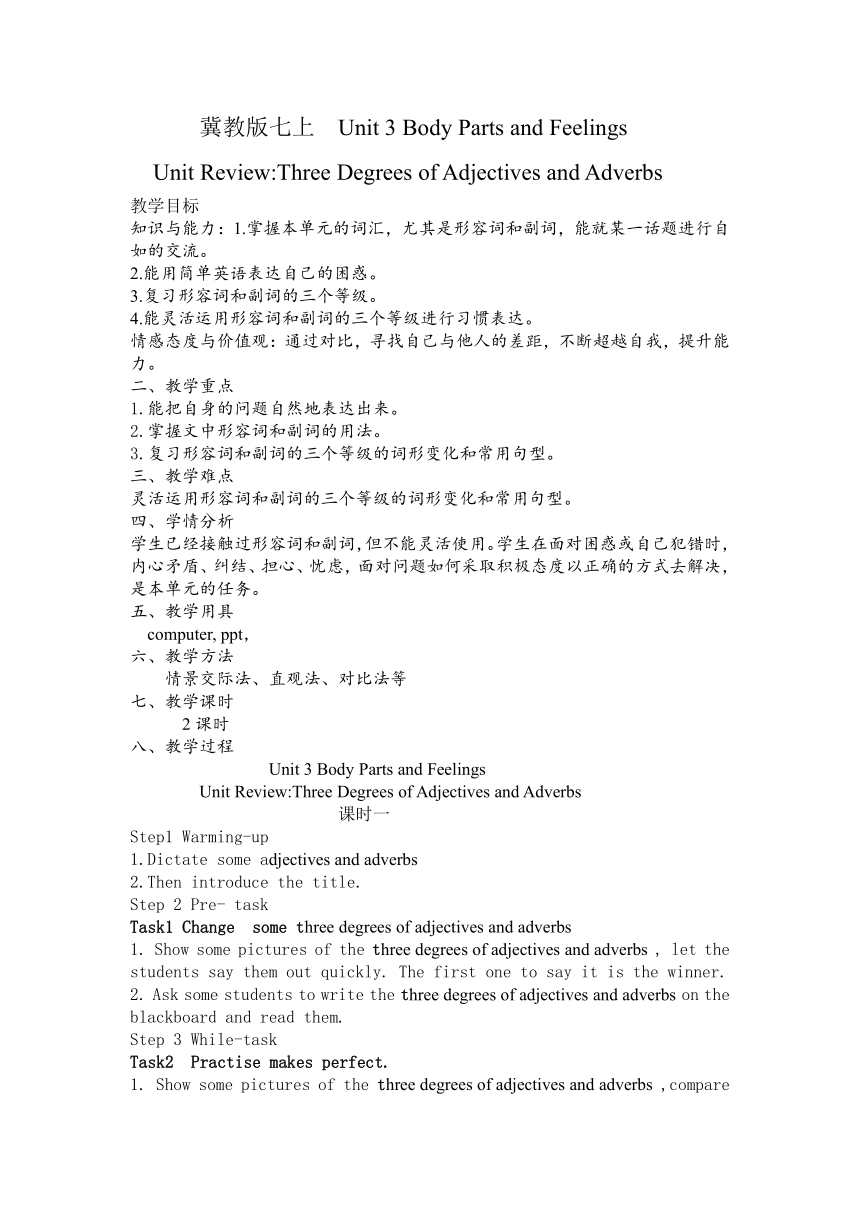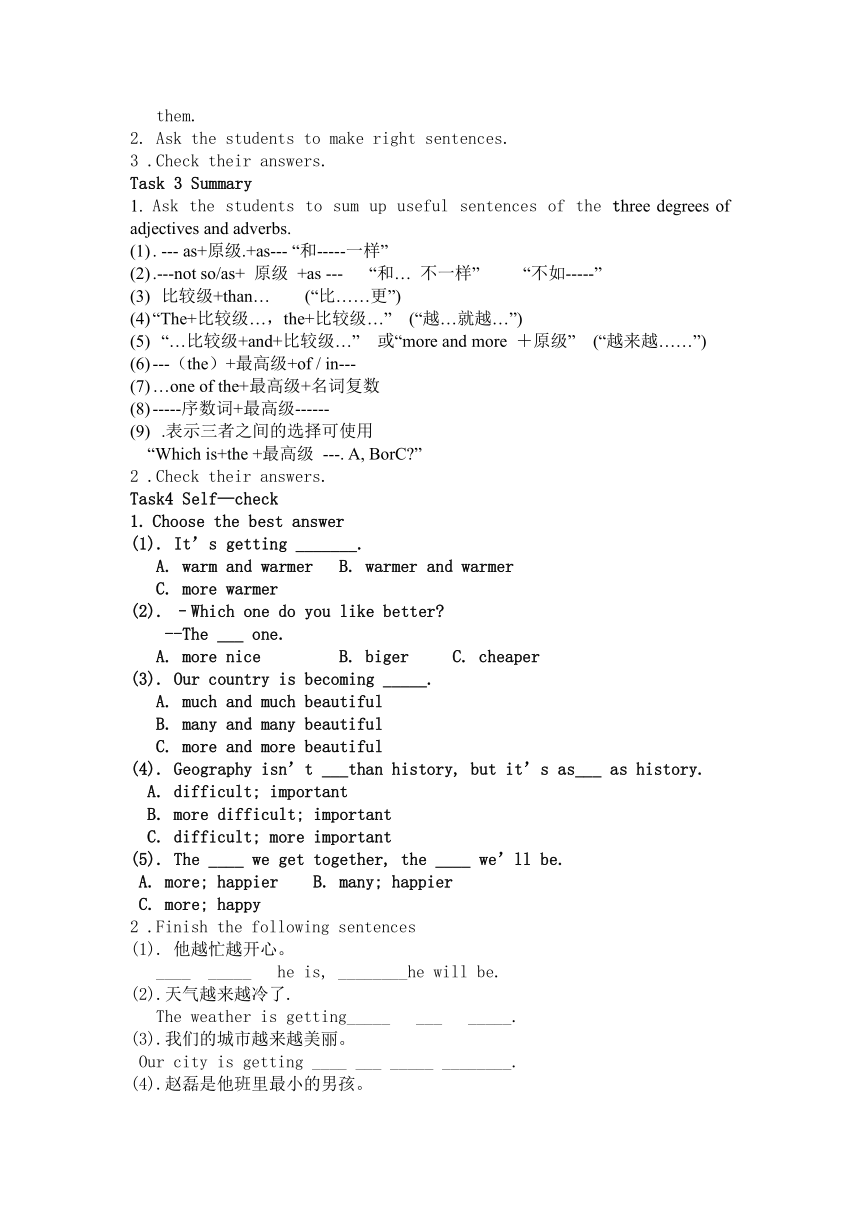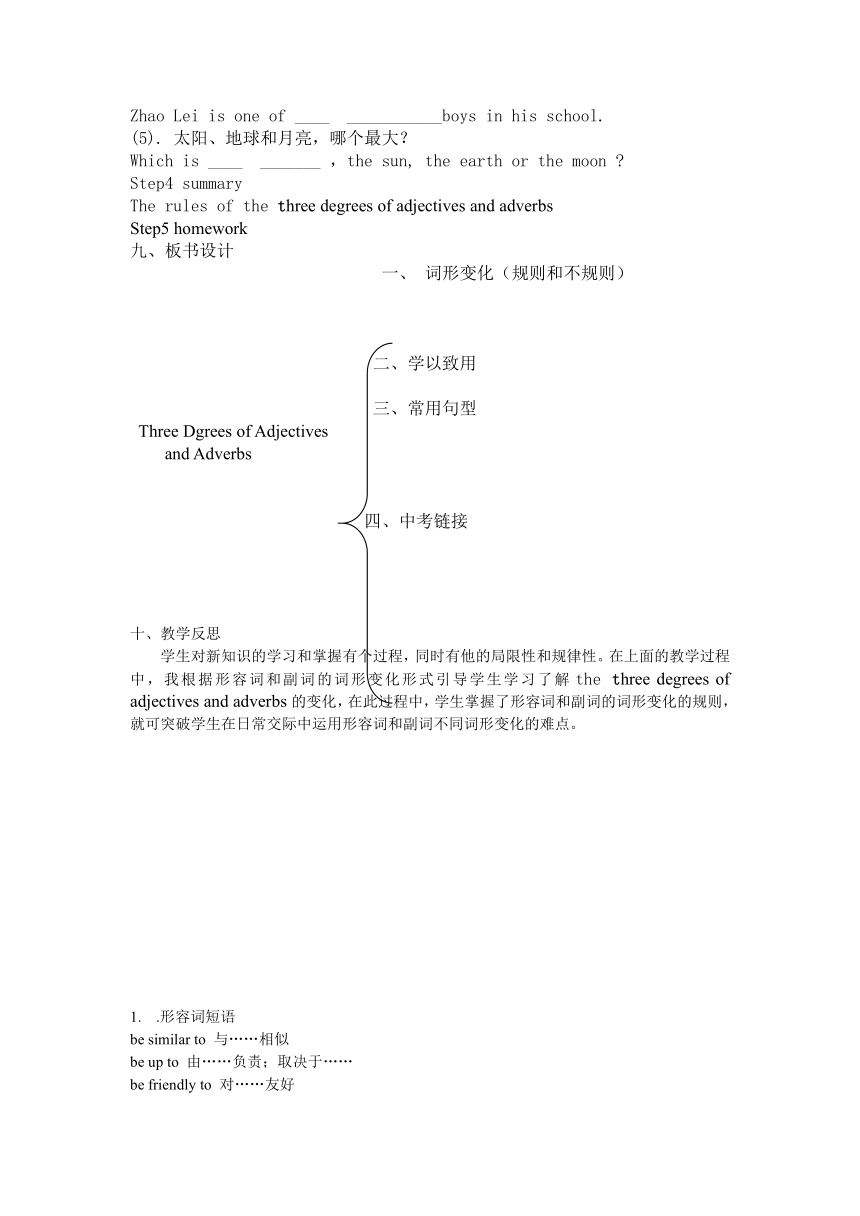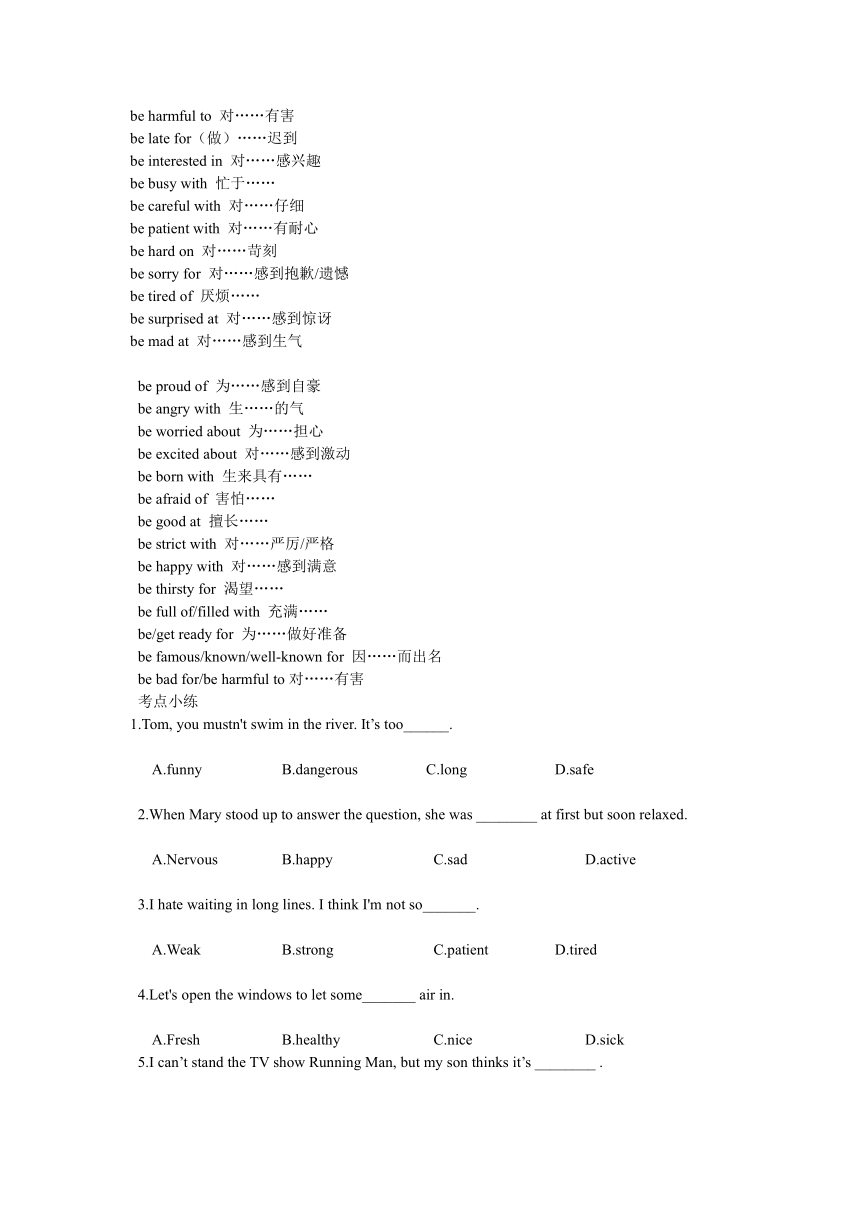冀教版七上英语 Unit 3 Body parts and Feelings Review 教案
文档属性
| 名称 | 冀教版七上英语 Unit 3 Body parts and Feelings Review 教案 |

|
|
| 格式 | doc | ||
| 文件大小 | 138.0KB | ||
| 资源类型 | 教案 | ||
| 版本资源 | 冀教版 | ||
| 科目 | 英语 | ||
| 更新时间 | 2021-01-24 17:32:51 | ||
图片预览





文档简介
冀教版七上 Unit 3 Body Parts and Feelings
Unit Review:Three Degrees of Adjectives and Adverbs
教学目标
知识与能力:1.掌握本单元的词汇,尤其是形容词和副词,能就某一话题进行自如的交流。
2.能用简单英语表达自己的困惑。
3.复习形容词和副词的三个等级。
4.能灵活运用形容词和副词的三个等级进行习惯表达。
情感态度与价值观:通过对比,寻找自己与他人的差距,不断超越自我,提升能力。
二、教学重点
1.能把自身的问题自然地表达出来。
2.掌握文中形容词和副词的用法。
3.复习形容词和副词的三个等级的词形变化和常用句型。
三、教学难点
灵活运用形容词和副词的三个等级的词形变化和常用句型。
学情分析
学生已经接触过形容词和副词,但不能灵活使用。学生在面对困惑或自己犯错时,内心矛盾、纠结、担心、忧虑,面对问题如何采取积极态度以正确的方式去解决,是本单元的任务。
教学用具
computer, ppt,
教学方法
情景交际法、直观法、对比法等
教学课时
2课时
教学过程
Unit 3 Body Parts and Feelings
Unit Review:Three Degrees of Adjectives and Adverbs
课时一
Step1 Warming-up
1.Dictate some adjectives and adverbs
2.Then introduce the title.
Step 2 Pre- task
Task1 Change some three degrees of adjectives and adverbs
1. Show some pictures of the three degrees of adjectives and adverbs , let the students say them out quickly. The first one to say it is the winner.
2. Ask some students to write the three degrees of adjectives and adverbs on the blackboard and read them.
Step 3 While-task
Task2 Practise makes perfect.
Show some pictures of the three degrees of adjectives and adverbs ,compare them.
Ask the students to make right sentences.
3 .Check their answers.
Task 3 Summary
Ask the students to sum up useful sentences of the three degrees of adjectives and adverbs.
. --- as+原级.+as--- “和-----一样”
.---not so/as+ 原级 +as --- “和… 不一样” “不如-----”
比较级+than… (“比……更”)
“The+比较级…,the+比较级…” (“越…就越…”)
“…比较级+and+比较级…” 或“more and more +原级” (“越来越……”)
---(the)+最高级+of / in---
…one of the+最高级+名词复数
-----序数词+最高级------
.表示三者之间的选择可使用
“Which is+the +最高级 ---. A, BorC?”
2 .Check their answers.
Task4 Self—check
Choose the best answer
(1). It’s getting _______.
A. warm and warmer B. warmer and warmer
C. more warmer
(2). 朩hich one do you like better?
--The ___ one.
A. more nice B. biger C. cheaper
(3). Our country is becoming _____.
A. much and much beautiful
B. many and many beautiful
C. more and more beautiful
(4). Geography isn抰 ___than history, but it抯 as___ as history.
A. difficult; important
B. more difficult; important
C. difficult; more important
(5). The ____ we get together, the ____ we抣l be.
A. more; happier B. many; happier
C. more; happy
2 .Finish the following sentences
(1). 他越忙越开心。
____ _____ he is, ________he will be.
(2).天气越来越冷了.
The weather is getting_____ ___ _____.
(3).我们的城市越来越美丽。
Our city is getting ____ ___ _____ ________.
(4).赵磊是他班里最小的男孩。
Zhao Lei is one of ____ ___________boys in his school.
(5). 太阳、地球和月亮,哪个最大?
Which is ____ _______ ,the sun, the earth or the moon ?
Step4 summary
The rules of the three degrees of adjectives and adverbs
Step5 homework
板书设计
一、 词形变化(规则和不规则)
二、学以致用
三、常用句型
Three Dgrees of Adjectives
and Adverbs
四、中考链接
教学反思
学生对新知识的学习和掌握有个过程,同时有他的局限性和规律性。在上面的教学过程中,我根据形容词和副词的词形变化形式引导学生学习了解the three degrees of adjectives and adverbs的变化,在此过程中,学生掌握了形容词和副词的词形变化的规则,就可突破学生在日常交际中运用形容词和副词不同词形变化的难点。
.形容词短语
be similar to 与……相似
be up to 由……负责;取决于……
be friendly to 对……友好
be harmful to 对……有害
be late for(做)……迟到
be interested in 对……感兴趣
be busy with 忙于……
be careful with 对……仔细
be patient with 对……有耐心
be hard on 对……苛刻
be sorry for 对……感到抱歉/遗憾
be tired of 厌烦……
be surprised at 对……感到惊讶
be mad at 对……感到生气
be proud of 为……感到自豪
be angry with 生……的气
be worried about 为……担心
be excited about 对……感到激动
be born with 生来具有……
be afraid of 害怕……
be good at 擅长……
be strict with 对……严厉/严格
be happy with 对……感到满意
be thirsty for 渴望……
be full of/filled with 充满……
be/get ready for 为……做好准备
be famous/known/well-known for 因……而出名
be bad for/be harmful to对……有害
考点小练
1.Tom, you mustn't swim in the river. It’s too______.
?
A.funny B.dangerous C.long D.safe
?
2.When Mary stood up to answer the question, she was ________ at first but soon relaxed.
A.Nervous B.happy C.sad D.active
3.I hate waiting in long lines. I think I'm not so_______.
A.Weak B.strong C.patient D.tired
4.Let's open the windows to let some_______ air in.
A.Fresh B.healthy C.nice D.sick
5.I can抰 stand the TV show Running Man, but my son thinks it抯 ________ .
A.Famous B.humorous C.proud D.interesting
6.The girl with __________ curly hair is my best friend Tina.
A.Rich B.long C.good D.fat
7.I can抰 see anything in the box because it is _______.
A.Ugly B.heavy C.empty D.beautiful
8.别怕,大胆地说。
?
Don’t _________________ speaking up.
?
9.当你的孩子再次犯错时,不要生他的气。
?
Don’t _______________ your kid when he makes a mistake again.
?
10.一个懒惰的人经常说,“我厌倦了工作。”
?
A lazy person often says:“I _________________ working.”
?
11.你得随时以防不测。
?
You had to _______________ any emergency.
?
12.打断其他人是不礼貌的。要一直礼貌地等。
?
It’s _______________ to cut in on others. Always wait politely.
二、副词的用法和辨析
1.副词的构成
构成 例词
与形容词同形 low,?fast,?late,?early,?much,?deep,?little,?hard,?only,?back,?just,?
enough,?long,?high,?slow
形容词后直接加-ly sad→sadly;?polite→politely
以辅音字母加y结尾的形容词变y为i再加-ly happy→happily;?angry→angrily;?busy→busily
以辅音字母加le结尾的形容词,去e加-y simple→simply;?terrible→terribly;?gentle→gently
少数以e结尾的形容词,去掉e再加-ly true→truly;?due→duly
2.副词的用法
(1)方式副词(放在不及物动词之后或及物动词之前)
happily 快乐地 luckily 幸运地
clearly? 清晰地 alone 独自地
fast 快速地 quickly 快速地
well 好地,优质地 badly 坏地,劣质地
brightly 明亮地 ?certainly 确定地
hard 难地 early 早地
2.时间副词一般放在句尾。
early 早 late 晚,迟
immediately 立即,立刻 soon 很快
once 曾经,以前 still 仍然
suddenly 突然 then 然后
already 已经 just 正好,恰好
yet 还,已经 sometimes 有时
at?first 首先 at?once 立刻,马上
at?last 最后 as?well/
too/either 也
(3)频度副词/词组(放在行为动词之前或助动词、情态动词及be动词之后)
twice 两次 daily 天天
weekly 每周,每周一次 every?day 每天
every?week 每周 every?month 每月
always 总是,经常 usually 通常
often 经常,常常 sometimes 有时
ever 曾经 never(2018.40) 从来不?
again?and?again 一次又一次 at?times 有时,间或
now?and?then 偶尔 not…any?
more/longer? 不再
(4)程度副词(放在被修饰的形容词或副词前,情态动词之后。enough修饰形容词或副词时须后置)
quite 相当,完全,十分 rather 相当,颇
very 非常 much 许多
a?lot 许多 a?little 一点儿,一些
a?bit 少量 enough 足够
hardly 几乎不 mostly 大多数
nearly 几乎 almost 差不多
deeply 深深地 completely 完全地
(5)疑问副词/词组(通常置于句首)
when 什么时候 how?long 多久
where 哪里 how?soon 多快
why 为什么 how?often 多久一次
how 怎样 how?far 多远
how?much 多少(提问不
可数名词) how?many 多少(提问可
数名词复数)
(6)地点副词(一般放在句尾)
here 在这里 there 在那里
upstairs 在楼上 downstairs 在楼下
above 在……上边 behind 在……后边
everywhere 每个地方 anywhere 任何地方
(7)其他副词
however 然而 besides 此外
instead 相反 exactly 准确地
probably 可能 eventually 终于
then 然后 therefore 因此
13.I can't hear you ________.Something may be wrong with my telephone.
?
A.Clearly B.quietly C.loudly D.nearly
?
14.We'll have to say goodbye, my dear friends! But I will __________ forget the days we spent together.
?
A.Always B.often C.never D.usually
?
15.—Would you like some green tea?
?
—No, thanks. I __________ drink green tea. It hurts my stomach.
?
A.Almost B.seldom C.only D.still
16.The novel is so instructive that I can _________ tear myself away from it.
?
A.Hardly B.deeply C.rather D.enough
17.I know it’s __________ around here between these two houses.
?
A.Anywhere B.everywhere C.somewhere D.nowhere
?
18.My brother likes sports very much. He _________ does exercise after school.
?
A.Never B.always C.sometimes D.ever
19.There was a big fire yesterday. ___________, no one was hurt.
?
A.Luckily B.Luck C.Badly D.Bad
?
20.Steve isn’t as ________ as Kelly. He often makes mistakes in his writing.
?
A.Careful B.carefully C.easy D.easily
?三、形容词和副词的比较等级
1.规则变化
类别 构成方法 原级 比较级 最高级
单音节词和少数双音节词 直接加-er,?-est young
tall younger
taller youngest
tallest
以不发音的字母e结尾的加-r,?-st nice
large nicer
larger nicest
largest
以重读闭音节结尾,如末尾只有一个辅音字母,则双写这一辅音字母,再加-er,?-est big
fat
hot bigger
fatter
hotter biggest
fattest
hottest
以辅音字母加y结尾,变y为i,再加-er,?-est happy
easy
healthy happier
easier
healthier happiest
easiest
healthiest
多音 节和
部分
双音
节词 有些双音节词和多音节词,比较级在词前加more,最高级在词前加most
important more?
important the?most?
important
careful ?more?
careful the?most
?careful
?interesting more
interesting ?the?most?
interesting
2.不规则变化
原级 比较级 最高级
good/well better best
bad/ill worse worst
many/much more most
little less least
far farther/further farthest/furthest
old older/elder oldest/eldest
等级 结构 例句 修饰词
原级 A...+as+原级+as+B,表示“A与B一样……”。 Lucy?is?as?old?as?Kate.
露西和凯特的年龄一样大。 very,
so,
too,
enough,
?quite,
rather
A...+not+so/as+原级+as+B,表示“A不及B那么……”。 This?classroom?is?not?as?big?as?that?one.
这间教室不如那间大。
A...+倍数+as+形容词原级+as+B,表示“A是B的……倍”。 Our?school?is?twice?as?large?as?theirs.
我们学校是他们学校的两倍大。
等级 结构 例句 修饰词
比较级 比较级+and+比较级,表示“越来越……”。 Our?city?is?becoming?more?and?more?beautiful.我们的城市变得越来越漂亮了。 a?little,
a?bit,
a?lot,
much,
even,
still,?
far
the+比较级…,?the+比较级……,表示“越……,越……”。 The?harder?you?work,?the?better?your?grades?will?be.你越努力,你的成绩就会越好。
A...+the+比较级+?of?the?two+…,表示“A是两者中较……的”。 He?is?the?thinner?of?the?two.他是这两个人中较瘦的那个。
A...+比较级+?than+?any?other+单数名词,表示“A比同一范围内的任何一个/物都……”。 ?Xiao?Ming?is?taller?than?any?other?student?in?his?class.小明比他班里任何一个学生都高。
等级 结构 例句
最高级 主语...+the+最高级+(单数可数名词)+in/of...,表示“……是……中最……的”。 I?jump?the?highest?in?my?class.我是我们班跳高跳得最高的。
主语...+one?of?the+最高级+复数可数名词+in/of...,表示“……是……中最……之一”。 Beijing?is?one?of?the?biggest?cities?in?China.北京是中国最大的城市之一。
特殊疑问词...+the+最高级,?A,B?or?C?用于三者以上人或物的比较。 Which?season?do?you?like?best,?spring,?summer?or?autumn?你最喜欢哪个季节,春天、夏天还是秋天?
the+序数词+最高级,表示“第几最……”。 The?Yellow?River?is?the?second?longest?river?in?China.黄河是中国第二长河。
21.It was late. She opened the door __________ because she didn’t want to wake up her grandma.
?
A.Quietly B.quiet C.loudly D.loud
?
22.You have to be ___________ and wait until I finish my work.
?
A.Patient B.patiently C.active D.actively
?
23.The little kid got home ___________ with the help of a policeman.
?
A.Safe B.safely C.quiet D.quietly
24.My English has improved. I feel it is much _______ now.
?
A.Easy B.easier C.easiest D.easily
?
25.—How do you like the song Chengdu sung by Zhao Lei?
?
—Oh, I have never enjoyed a ________ one before.
?
A.Well B.best C.good D.better
?
26.Jessica's parents have four daughters, and she is ________ child.
?
A.Young B.younger C.youngest D.the youngest
Unit Review:Three Degrees of Adjectives and Adverbs
教学目标
知识与能力:1.掌握本单元的词汇,尤其是形容词和副词,能就某一话题进行自如的交流。
2.能用简单英语表达自己的困惑。
3.复习形容词和副词的三个等级。
4.能灵活运用形容词和副词的三个等级进行习惯表达。
情感态度与价值观:通过对比,寻找自己与他人的差距,不断超越自我,提升能力。
二、教学重点
1.能把自身的问题自然地表达出来。
2.掌握文中形容词和副词的用法。
3.复习形容词和副词的三个等级的词形变化和常用句型。
三、教学难点
灵活运用形容词和副词的三个等级的词形变化和常用句型。
学情分析
学生已经接触过形容词和副词,但不能灵活使用。学生在面对困惑或自己犯错时,内心矛盾、纠结、担心、忧虑,面对问题如何采取积极态度以正确的方式去解决,是本单元的任务。
教学用具
computer, ppt,
教学方法
情景交际法、直观法、对比法等
教学课时
2课时
教学过程
Unit 3 Body Parts and Feelings
Unit Review:Three Degrees of Adjectives and Adverbs
课时一
Step1 Warming-up
1.Dictate some adjectives and adverbs
2.Then introduce the title.
Step 2 Pre- task
Task1 Change some three degrees of adjectives and adverbs
1. Show some pictures of the three degrees of adjectives and adverbs , let the students say them out quickly. The first one to say it is the winner.
2. Ask some students to write the three degrees of adjectives and adverbs on the blackboard and read them.
Step 3 While-task
Task2 Practise makes perfect.
Show some pictures of the three degrees of adjectives and adverbs ,compare them.
Ask the students to make right sentences.
3 .Check their answers.
Task 3 Summary
Ask the students to sum up useful sentences of the three degrees of adjectives and adverbs.
. --- as+原级.+as--- “和-----一样”
.---not so/as+ 原级 +as --- “和… 不一样” “不如-----”
比较级+than… (“比……更”)
“The+比较级…,the+比较级…” (“越…就越…”)
“…比较级+and+比较级…” 或“more and more +原级” (“越来越……”)
---(the)+最高级+of / in---
…one of the+最高级+名词复数
-----序数词+最高级------
.表示三者之间的选择可使用
“Which is+the +最高级 ---. A, BorC?”
2 .Check their answers.
Task4 Self—check
Choose the best answer
(1). It’s getting _______.
A. warm and warmer B. warmer and warmer
C. more warmer
(2). 朩hich one do you like better?
--The ___ one.
A. more nice B. biger C. cheaper
(3). Our country is becoming _____.
A. much and much beautiful
B. many and many beautiful
C. more and more beautiful
(4). Geography isn抰 ___than history, but it抯 as___ as history.
A. difficult; important
B. more difficult; important
C. difficult; more important
(5). The ____ we get together, the ____ we抣l be.
A. more; happier B. many; happier
C. more; happy
2 .Finish the following sentences
(1). 他越忙越开心。
____ _____ he is, ________he will be.
(2).天气越来越冷了.
The weather is getting_____ ___ _____.
(3).我们的城市越来越美丽。
Our city is getting ____ ___ _____ ________.
(4).赵磊是他班里最小的男孩。
Zhao Lei is one of ____ ___________boys in his school.
(5). 太阳、地球和月亮,哪个最大?
Which is ____ _______ ,the sun, the earth or the moon ?
Step4 summary
The rules of the three degrees of adjectives and adverbs
Step5 homework
板书设计
一、 词形变化(规则和不规则)
二、学以致用
三、常用句型
Three Dgrees of Adjectives
and Adverbs
四、中考链接
教学反思
学生对新知识的学习和掌握有个过程,同时有他的局限性和规律性。在上面的教学过程中,我根据形容词和副词的词形变化形式引导学生学习了解the three degrees of adjectives and adverbs的变化,在此过程中,学生掌握了形容词和副词的词形变化的规则,就可突破学生在日常交际中运用形容词和副词不同词形变化的难点。
.形容词短语
be similar to 与……相似
be up to 由……负责;取决于……
be friendly to 对……友好
be harmful to 对……有害
be late for(做)……迟到
be interested in 对……感兴趣
be busy with 忙于……
be careful with 对……仔细
be patient with 对……有耐心
be hard on 对……苛刻
be sorry for 对……感到抱歉/遗憾
be tired of 厌烦……
be surprised at 对……感到惊讶
be mad at 对……感到生气
be proud of 为……感到自豪
be angry with 生……的气
be worried about 为……担心
be excited about 对……感到激动
be born with 生来具有……
be afraid of 害怕……
be good at 擅长……
be strict with 对……严厉/严格
be happy with 对……感到满意
be thirsty for 渴望……
be full of/filled with 充满……
be/get ready for 为……做好准备
be famous/known/well-known for 因……而出名
be bad for/be harmful to对……有害
考点小练
1.Tom, you mustn't swim in the river. It’s too______.
?
A.funny B.dangerous C.long D.safe
?
2.When Mary stood up to answer the question, she was ________ at first but soon relaxed.
A.Nervous B.happy C.sad D.active
3.I hate waiting in long lines. I think I'm not so_______.
A.Weak B.strong C.patient D.tired
4.Let's open the windows to let some_______ air in.
A.Fresh B.healthy C.nice D.sick
5.I can抰 stand the TV show Running Man, but my son thinks it抯 ________ .
A.Famous B.humorous C.proud D.interesting
6.The girl with __________ curly hair is my best friend Tina.
A.Rich B.long C.good D.fat
7.I can抰 see anything in the box because it is _______.
A.Ugly B.heavy C.empty D.beautiful
8.别怕,大胆地说。
?
Don’t _________________ speaking up.
?
9.当你的孩子再次犯错时,不要生他的气。
?
Don’t _______________ your kid when he makes a mistake again.
?
10.一个懒惰的人经常说,“我厌倦了工作。”
?
A lazy person often says:“I _________________ working.”
?
11.你得随时以防不测。
?
You had to _______________ any emergency.
?
12.打断其他人是不礼貌的。要一直礼貌地等。
?
It’s _______________ to cut in on others. Always wait politely.
二、副词的用法和辨析
1.副词的构成
构成 例词
与形容词同形 low,?fast,?late,?early,?much,?deep,?little,?hard,?only,?back,?just,?
enough,?long,?high,?slow
形容词后直接加-ly sad→sadly;?polite→politely
以辅音字母加y结尾的形容词变y为i再加-ly happy→happily;?angry→angrily;?busy→busily
以辅音字母加le结尾的形容词,去e加-y simple→simply;?terrible→terribly;?gentle→gently
少数以e结尾的形容词,去掉e再加-ly true→truly;?due→duly
2.副词的用法
(1)方式副词(放在不及物动词之后或及物动词之前)
happily 快乐地 luckily 幸运地
clearly? 清晰地 alone 独自地
fast 快速地 quickly 快速地
well 好地,优质地 badly 坏地,劣质地
brightly 明亮地 ?certainly 确定地
hard 难地 early 早地
2.时间副词一般放在句尾。
early 早 late 晚,迟
immediately 立即,立刻 soon 很快
once 曾经,以前 still 仍然
suddenly 突然 then 然后
already 已经 just 正好,恰好
yet 还,已经 sometimes 有时
at?first 首先 at?once 立刻,马上
at?last 最后 as?well/
too/either 也
(3)频度副词/词组(放在行为动词之前或助动词、情态动词及be动词之后)
twice 两次 daily 天天
weekly 每周,每周一次 every?day 每天
every?week 每周 every?month 每月
always 总是,经常 usually 通常
often 经常,常常 sometimes 有时
ever 曾经 never(2018.40) 从来不?
again?and?again 一次又一次 at?times 有时,间或
now?and?then 偶尔 not…any?
more/longer? 不再
(4)程度副词(放在被修饰的形容词或副词前,情态动词之后。enough修饰形容词或副词时须后置)
quite 相当,完全,十分 rather 相当,颇
very 非常 much 许多
a?lot 许多 a?little 一点儿,一些
a?bit 少量 enough 足够
hardly 几乎不 mostly 大多数
nearly 几乎 almost 差不多
deeply 深深地 completely 完全地
(5)疑问副词/词组(通常置于句首)
when 什么时候 how?long 多久
where 哪里 how?soon 多快
why 为什么 how?often 多久一次
how 怎样 how?far 多远
how?much 多少(提问不
可数名词) how?many 多少(提问可
数名词复数)
(6)地点副词(一般放在句尾)
here 在这里 there 在那里
upstairs 在楼上 downstairs 在楼下
above 在……上边 behind 在……后边
everywhere 每个地方 anywhere 任何地方
(7)其他副词
however 然而 besides 此外
instead 相反 exactly 准确地
probably 可能 eventually 终于
then 然后 therefore 因此
13.I can't hear you ________.Something may be wrong with my telephone.
?
A.Clearly B.quietly C.loudly D.nearly
?
14.We'll have to say goodbye, my dear friends! But I will __________ forget the days we spent together.
?
A.Always B.often C.never D.usually
?
15.—Would you like some green tea?
?
—No, thanks. I __________ drink green tea. It hurts my stomach.
?
A.Almost B.seldom C.only D.still
16.The novel is so instructive that I can _________ tear myself away from it.
?
A.Hardly B.deeply C.rather D.enough
17.I know it’s __________ around here between these two houses.
?
A.Anywhere B.everywhere C.somewhere D.nowhere
?
18.My brother likes sports very much. He _________ does exercise after school.
?
A.Never B.always C.sometimes D.ever
19.There was a big fire yesterday. ___________, no one was hurt.
?
A.Luckily B.Luck C.Badly D.Bad
?
20.Steve isn’t as ________ as Kelly. He often makes mistakes in his writing.
?
A.Careful B.carefully C.easy D.easily
?三、形容词和副词的比较等级
1.规则变化
类别 构成方法 原级 比较级 最高级
单音节词和少数双音节词 直接加-er,?-est young
tall younger
taller youngest
tallest
以不发音的字母e结尾的加-r,?-st nice
large nicer
larger nicest
largest
以重读闭音节结尾,如末尾只有一个辅音字母,则双写这一辅音字母,再加-er,?-est big
fat
hot bigger
fatter
hotter biggest
fattest
hottest
以辅音字母加y结尾,变y为i,再加-er,?-est happy
easy
healthy happier
easier
healthier happiest
easiest
healthiest
多音 节和
部分
双音
节词 有些双音节词和多音节词,比较级在词前加more,最高级在词前加most
important more?
important the?most?
important
careful ?more?
careful the?most
?careful
?interesting more
interesting ?the?most?
interesting
2.不规则变化
原级 比较级 最高级
good/well better best
bad/ill worse worst
many/much more most
little less least
far farther/further farthest/furthest
old older/elder oldest/eldest
等级 结构 例句 修饰词
原级 A...+as+原级+as+B,表示“A与B一样……”。 Lucy?is?as?old?as?Kate.
露西和凯特的年龄一样大。 very,
so,
too,
enough,
?quite,
rather
A...+not+so/as+原级+as+B,表示“A不及B那么……”。 This?classroom?is?not?as?big?as?that?one.
这间教室不如那间大。
A...+倍数+as+形容词原级+as+B,表示“A是B的……倍”。 Our?school?is?twice?as?large?as?theirs.
我们学校是他们学校的两倍大。
等级 结构 例句 修饰词
比较级 比较级+and+比较级,表示“越来越……”。 Our?city?is?becoming?more?and?more?beautiful.我们的城市变得越来越漂亮了。 a?little,
a?bit,
a?lot,
much,
even,
still,?
far
the+比较级…,?the+比较级……,表示“越……,越……”。 The?harder?you?work,?the?better?your?grades?will?be.你越努力,你的成绩就会越好。
A...+the+比较级+?of?the?two+…,表示“A是两者中较……的”。 He?is?the?thinner?of?the?two.他是这两个人中较瘦的那个。
A...+比较级+?than+?any?other+单数名词,表示“A比同一范围内的任何一个/物都……”。 ?Xiao?Ming?is?taller?than?any?other?student?in?his?class.小明比他班里任何一个学生都高。
等级 结构 例句
最高级 主语...+the+最高级+(单数可数名词)+in/of...,表示“……是……中最……的”。 I?jump?the?highest?in?my?class.我是我们班跳高跳得最高的。
主语...+one?of?the+最高级+复数可数名词+in/of...,表示“……是……中最……之一”。 Beijing?is?one?of?the?biggest?cities?in?China.北京是中国最大的城市之一。
特殊疑问词...+the+最高级,?A,B?or?C?用于三者以上人或物的比较。 Which?season?do?you?like?best,?spring,?summer?or?autumn?你最喜欢哪个季节,春天、夏天还是秋天?
the+序数词+最高级,表示“第几最……”。 The?Yellow?River?is?the?second?longest?river?in?China.黄河是中国第二长河。
21.It was late. She opened the door __________ because she didn’t want to wake up her grandma.
?
A.Quietly B.quiet C.loudly D.loud
?
22.You have to be ___________ and wait until I finish my work.
?
A.Patient B.patiently C.active D.actively
?
23.The little kid got home ___________ with the help of a policeman.
?
A.Safe B.safely C.quiet D.quietly
24.My English has improved. I feel it is much _______ now.
?
A.Easy B.easier C.easiest D.easily
?
25.—How do you like the song Chengdu sung by Zhao Lei?
?
—Oh, I have never enjoyed a ________ one before.
?
A.Well B.best C.good D.better
?
26.Jessica's parents have four daughters, and she is ________ child.
?
A.Young B.younger C.youngest D.the youngest
同课章节目录
- Unit 1 School and friends
- Lesson 1 Hello!
- Lesson 2 Teacher and Students
- Lesson 3 Welcome to Our School
- Lesson 4 What Is It?
- Lesson 5 May I Have a Book?
- Lesson 6 Things for School
- Unit 2 Colours and Clothes
- Lesson 7 Jenny's New Skirt
- Lesson 8 Danny's Favourit Colou
- Lesson 9 Whose Coat Is This?
- Lesson 10 Clothes for a Cold Day
- Lesson 11 Clothes around the World
- Lesson 12 Let's Go Shopping!
- Unit 3 Body Parts and Feelings
- Lesson 13 Body Parts
- Lesson 14 Colours and Feelings
- Lesson 15 Tall or Short
- Lesson 16 Happy or Sad
- Lesson 17 Seeing a Docto
- Lesson 18 We All Look Different!
- Unit 4 Food and Restaurants
- Lesson 19 Time for Breakfast!
- Lesson 20 I Like the Supermarket!
- Lesson 21 At the Market
- Lesson 22 In the Restaurant
- Lesson 23 The Corner Store
- Lesson 24 Eat Good Food!
- Unit 5 Family and Home
- Lesson 25 Jenny's Family
- Lesson 26 Li Ming's Family
- Lesson 27 Danny at Home
- Lesson 28 A Family Picnic
- Lesson 29 A Birthday Card
- Lesson 30 Grandma's Birthday Party
- Unit 6 Let's Go!
- Lesson 31 Let's Go to the Bookstore!
- Lesson 32 At the Supermarket
- Lesson 33 Let's Go to the Zoo!
- Lesson 34 On the Farm
- Lesson 35 Let's Go to the Museum!
- Lesson 36 Let's Go to the Movie Theatre!
- Unit 7 Days and Months
- Lesson 37 Seasons and Weathe
- Lesson 38 Nick's Busy Month
- Lesson 39 A Class Calenda
- Lesson 40 When Is Your Birthday?
- Lesson 41 Holidays
- Lesson 42 Happy Holidays!
- Unit 8 Countries around the world
- Lesson 43 Directions
- Lesson 44 Jack's Goodbye Party
- Lesson 45 China
- Lesson 46 Canada and the U.S.
- Lesson 47 The U.K. and Australia
- Lesson 48 English-Speaking Countries
